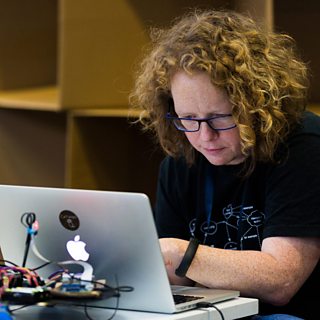The R&D Futures project develops our ability to pick up on trends in audience habits and their media and technology landscapes. We try to extrapolate how these trends might play out over the next few years and how R&D and the ΒιΆΉΤΌΕΔ might respond.
One of the ways we do this is by gathering links to things that we think look like signals of change and periodically bundling them together for analysis. This is our bundle for February 2022!
The project is run by Libby and Henry and a rotating crew of colleagues from across R&D and the wider ΒιΆΉΤΌΕΔ. If you're interested in collaborating with us, get in touch!

Photo by Maxim Hopman on Unsplash
Web3 shake up is happening
All the talk about Web3 being built on crypto infrastructure is starting to come apart with key figures such as Tim O'Reilly coming out in the mainstream press. People like Tim are making clear although blockchains, NFTs, etc are interesting, the future of the internet doesn't rely on it and shouldn't.
He and others are talking to the mainstream as the crypto backers have made a lot of progress in the last few months to convince the public of crypto as a replacement for so much. There is a lot internal fighting about these interviews but the winner is a interoperable protocols and standards, a key part of the digital public space/public service internet.
β Ian Forrester
Metaverse: in the cold light of day
A more considered reaction to the Metaverse concept/offer (can't help but feel that the M word will be filed alongside βcyberβ in a few years, and much better descriptors will be in general use) is forming. Hard questions regarding bandwidth, technology, cost and environmental impact are challenging the assumed buy-in. More philosophical questions regarding the , escapist and potential of virtual existence will grow. Expect to see more images in thought pieces.
Early experiences offered by Meta, such as the Foo Fighters concert are showing that Fortnite and Roblox are still the spaces to watch, and that although the metaverse is supposed to model the real world, designers of meta-experiences need to understand what makes events in the real world actually work.
β Spencer Marsden
Gentle Innovation
In contrast to the and so far baseless intellectual land-grab of Meta, Niantic, behind the breakout AR success of Pokemon Go have a more nuanced and incremental approach. They have a collaboration with Sony to test at scale spatial audio to their less famous but still massive game, and celebrating UGC created with Lightship SDK for Unity. Could the path to successful Metaverse platforms lie in considered release of tools and strong, open dialogues with creator-consumers?
β Spencer Marsden
Platform Vs Publisher
Spotify finds itself in a challenging place editorially due to Joe Rogan's podcast which is spreading . The companies is laid out below in an Endgadget article:
The CEO explained that Spotify is not a publisher, so it doesnβt have creative control over Roganβs show in advance. He said that since JRE is licensed content, it doesnβt have oversight like it does for podcasts from The Ringer or Gimlet β production companies Spotify owns. βWe donβt approve his guests in advance, and just like any other creator, we get his content when he publishes, and then we review it, and if it violates our policies, we take the appropriate enforcement actions,β Ek said.
β Prabhjit Bains
Who owns real estate in the metaverse?
We don't know what the metaverse will be like - will some of it be overlaid on our current global reality? Companies are already taking a punt on this by 'selling' rights to physical locations which can then be used in AR. Upland, which gamifies property deals already has this as a use-case. Is this a form of digital prospecting? What might this mean for those who own the 'real' space? What might someone see through AR glasses when they look at your property - do you have any rights over this? What determines the value of a piece of 'land'? Lawyers are starting to get their heads round this.
In future might there be a certifying authority to determine the validity of any claim?
β Laura Ellis
Social media as an unpleasant blast of collective emotion
Vibe emerges from a sense every platform dweller has felt: that other people and their emotions are simply too close. Afforded what feels like perfect access to a dizzying number of other persons, what they report to be thinking and feeling at any given moment, we have little choice but to take this data in aggregate, not as an accumulation of individualsβ joy and suffering but as a series of impersonal, thrumming emotional ground tones. These tones are often unpleasant, if only in a vague, formless way.
The is somewhat about machine learning algorithms making you experience similar vibes from a given platform, and connecting it to the trend of using content - especially music - to alter your mood. I see it as a companion to - also over-percieving. Itβs all just too much, and itβs typically negative. Prabhjit made the astute observation that it has to do with the commodification of emotion, and Ian connected it to lyspunkt, a .
How does the ΒιΆΉΤΌΕΔ respond to this? Perhaps with positive content? Or perhaps with meaningless content, things that donβt matter, and make you feel nothing, but provide a distraction, escape and respite? Or perhaps with nostalgia, where you already know what to feel?
And what does a better social network feel like?
β Libby Miller

